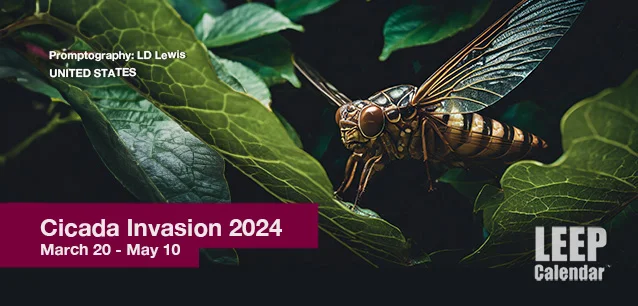 AD
AD
Today is: December 04
Scroll to explore events active on this date.
Additional Events on LEEP
LEEP INK FEATURES

August? Absolutely!
In August, we live through the Dog Days of Summer. It's hot and often humid, and those who can leave for better climates do. Down south, winter is in full force. August is also known as "the ...

In The Heat of July: July 2025 Events
Is it hot enough (or cold enough if you're below the equator) for you yet? There is actually a day for that! Like every month, I pick a diverse collection of events you may or may not know about. This ...

May Blooms: Events in May 2025
Along with October, May is one of the most densely packed months of the year. It's before the summer humidity and the last whole month of the school year. The weather is warming in t...
About the Cicada Invasion 2024
United States
Ends: May 10, 2024
DESCRIPTION:
The Cicadas Are Coming
It is about to get loud!
In an extraordinary natural event not seen since Thomas Jefferson's presidency, the Midwest and the Southeastern United States are bracing for an unprecedented dual emergence of cicadas. This spring, for the first time since 1803, Brood XIX (Great Southern Brood) and Brood XIII (Northern Illinois Brood) will simultaneously surface, marking a rare convergence of their 13-year and 17-year life cycles.
Floyd W. Shockley, an entomologist at the Smithsonian National Museum of Natural History, underscores the significance of this phenomenon. "Nobody alive today will see it happen again," he said, highlighting the rarity of such an event. The dual emergence, which will not occur again for another 221 years, is a humbling reminder of nature's long-spanning cycles.
These insects will emerge in late April. After tunneling out from the earth, the cicadas, identifiable by their distinctive red eyes, will undergo maturation. The males will soon create a chorus of buzzing, seeking mates, producing a sound surpassing the audible intensity of an airplane.
Dr. Shockley estimates that over a trillion cicadas will appear across approximately 16 states. If lined up end-to-end, this figure would stretch to the moon and back 33 times, illustrating the immense scale of the emergence.
This event also opens the door to potential interbreeding between the two broods in Northern Illinois, possibly leading to the creation of a new cicada brood. According to Dr. Shockley, such a development would be an "extremely rare event."
However, the cicadas' life span is short, lasting about a month, and their poor flying and landing skills often lead them to city streets and sidewalks, where they become hazards or nuisances. Dr. Shockley suggests utilizing the cicadas as natural fertilizer rather than disposing of them, highlighting their ecological benefit.
Gene Kritsky, a retired biology professor and author, maps out the progression of the cicada's emergence, starting from northern Louisiana and moving through various states, including North Carolina, Tennessee, Arkansas, Missouri, and Illinois. This six-week period will see the insects mating and depositing eggs, followed by their eventual death, which imparts a unique smell and serves as a natural fertilizer.
Experts emphasize the importance of cicadas to the ecosystem. They play a role in aerating soil, nourishing tree roots, and pruning trees naturally. John R. Cooley, a biology professor at the University of Connecticut, advises residents in affected areas to let the cicadas be and avoid insecticides, emphasizing their integral role in the forest ecosystem.
Dr. Shockley encourages the public to embrace this rare natural occurrence as this extraordinary event unfolds. Despite its intensity, he assures us that it will be a short-lived yet awe-inspiring spectacle in the natural world.
Quotes included come from the original article in the New York Times, "The World Hasn't Seen Cicadas Like This Since 1803," By Aimee Ortiz, published Jan. 19, 2024.
VIDEOS
SUPPORTING DOCUMENTS
Currently, this event does not have supporting documents.
ADDITIONAL IMAGES
Currently, this event does not have supporting images.
Where would you like to go now?
 AD
AD


/footer-logo.svg)
